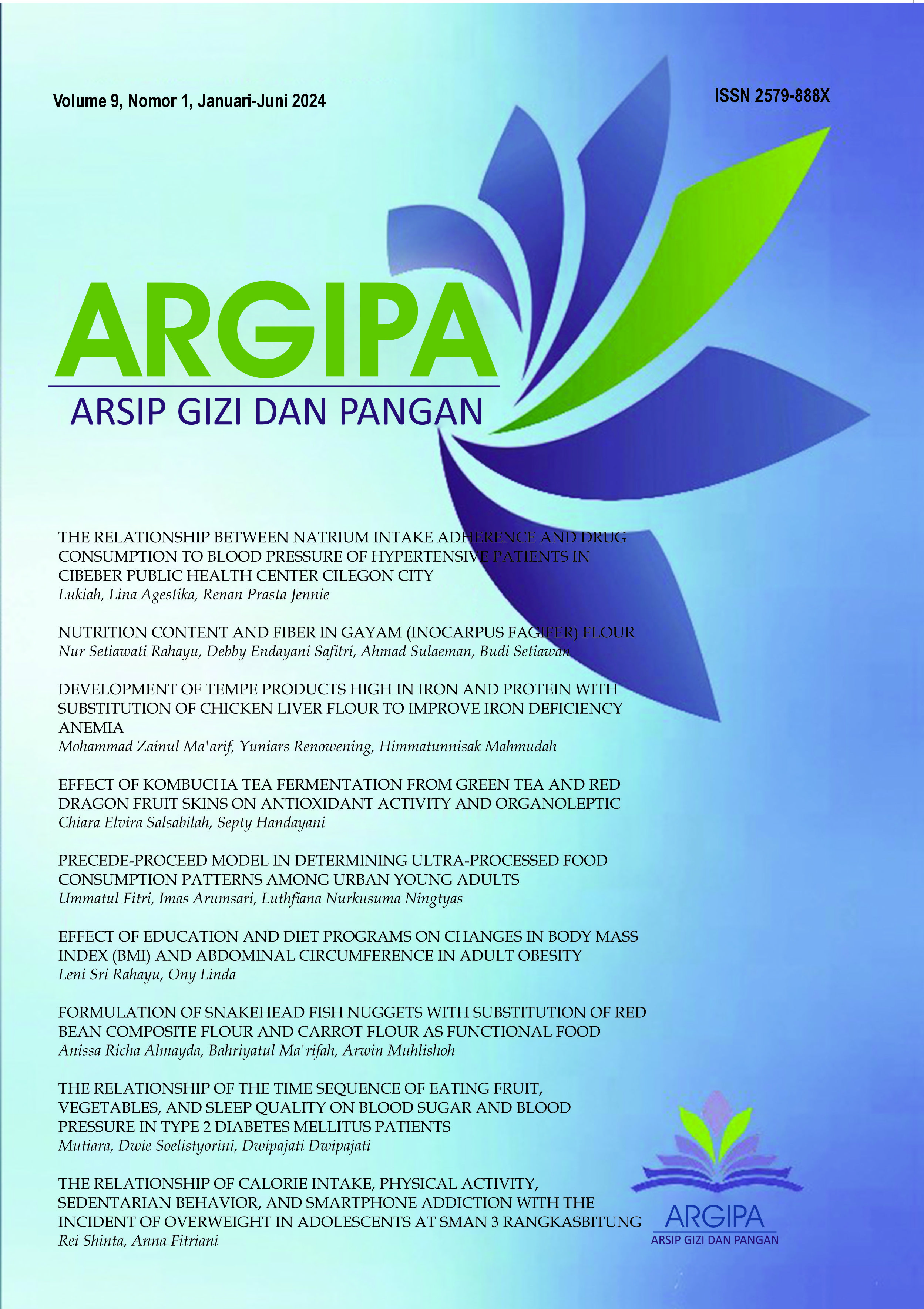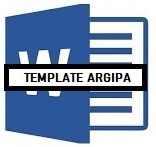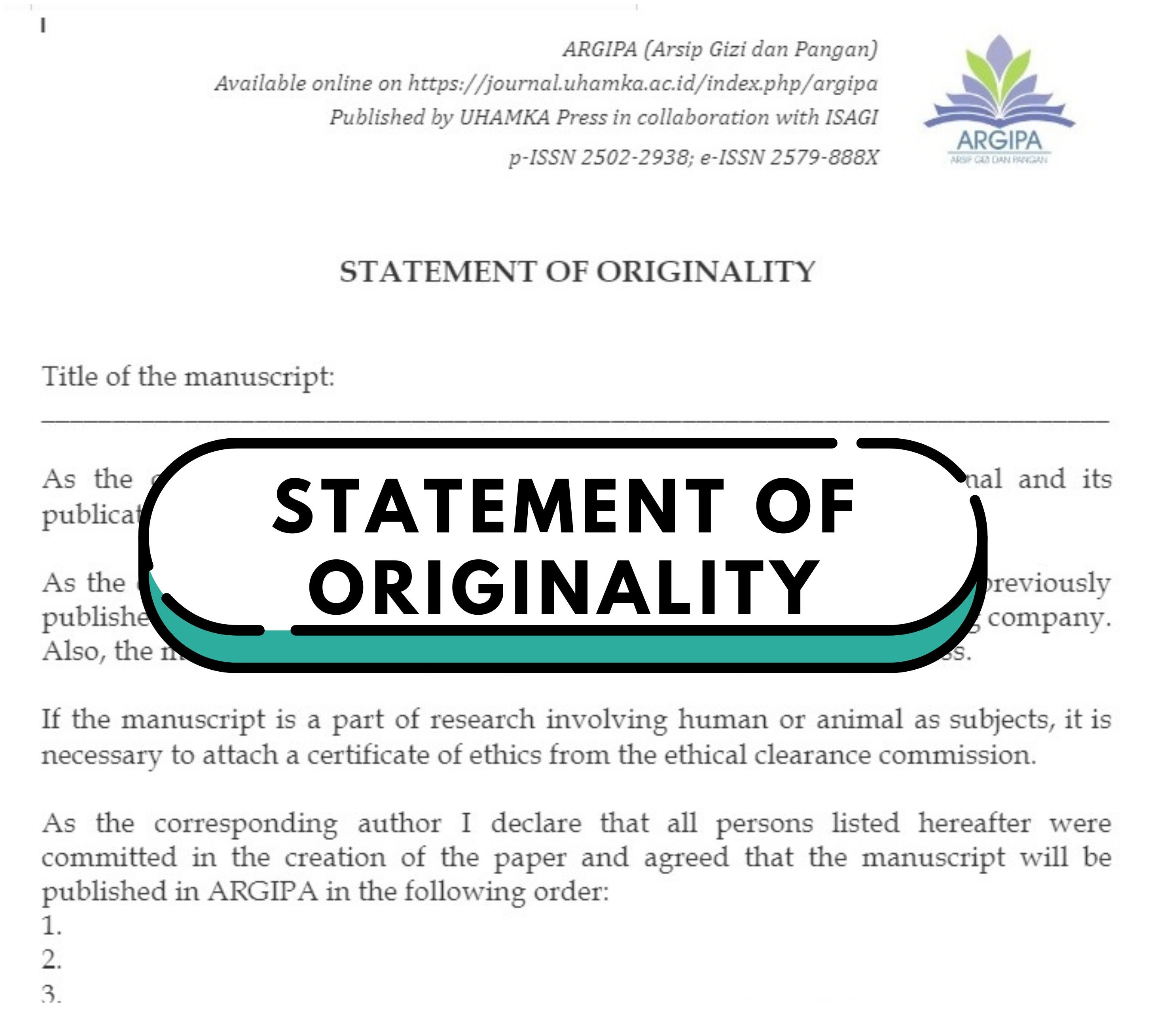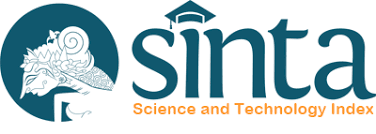The relationship between natrium intake adherence and drug consumption to blood pressure of hypertensive patients in Cibeber Public Health Center Cilegon City
DOI:
https://doi.org/10.22236/argipa.v9i1.12911Keywords:
Blood Pressure, Intake Natrium Adherence, Drug Consumption AdherenceAbstract
Hypertension is one of the most common and chronic non communicable diseases. Continuous hypertension can disrupt blood flow in the kidneys, heart and brain. Efforts used to treat hypertension are pharmacological therapy (anti-hypertension drugs) and non-pharmacological therapy (one of which is reducing sodium consumption). This study aims to determine the relationship between intake natrium adherence and drug consumption on blood pressure of hypertensive patients in the Cibeber Community Health Center, Cilegon City. This study used an analytic observational method with a cross sectional design. The sampling technique used consecutive sampling techniques with a subject size of 77 people. The instruments used were the 2x24 hour food recall and Morisky Medication Adherence Scale (MMAS-8). The results of the spearman rank analysis test concerning the relationship between intake natrium adherence and blood pressure, namely not having a significant. There is realtioship between intake natrium adherence and systolic blood pressure is a p-value of 0,426 (p>0,05) while the relationship between intake natrium adherence and diastolic blood pressure is 0,303 (p>0,05). The results of the spearman rank analysis test regarding the relationship between intake natrium adherence to drug consumption and pressure, namely having a significant. The relationship between drug comsumption adherence and systolic blood pressure is a p-value of 0,001 (p<0,05) while the p-value of the relationship between drug comsumption adherence and diastolic blood pressure is 0,009 (p<0,05).Downloads
References
Adam, L. (2019). Determinan hipertensi pada lanjut usia. Jambura Health and Sport Journal, 1(2), 82-89.
Agatha, R. (2019). Relationship between nutritional status, food intake, and sleep quality with blood pressure of member of Posbindu Mawar Kelurahan Kebayoran Lama Selatan. ARGIPA (Arsip Gizi dan Pangan), 4(2), 107–116.
Anwar, K. & Masnina, R. (2019). Hubungan kepatuhan minum obat antihipertensi dengan tekanan darah pada lansia penderita hipertensi di wilayah kerja Puskesmas Air Putih Samarinda. Borneo Studies and Research, 1(1), 494-501.
Cahyani, F. M. (2018). Hubungan kepatuhan minum obat antihipertensi terhadap tercapainya target terapi pasien hipertensi di Puskesmas Wirobrajan Yogjakarta. Journal of Pharmaceutical Science and Medical Research, 1(2), 10-16.
Ernawati, D. A., Harini, I. M., & Gumilas N. S. A. (2020). Faktor-faktor yang mempengaruhi tingkat kepatuhan diet pada pasien diabetes melitus tipe 2 di Kecamatan Sumbang Banyumas. Jurnal of Bionursing, 2(1), 63-67.
Indawati, I. I., Agustiningsih, N., & Fikriana, R. (2020). Kepatuhan minum obat dapat mengontrol tekanan darah tinggi pada penderita hipertensi: A Literature Review. Jurnal Citra Keperawatan, 8(2), 101-108.
Kemenkes. (2019a). Laporan Nasional Riskesdas 2018. Jakarta: Badan Penelitian dan Pengembangan Kesehatan.
Kemenkes. (2019b). Laporan Provinsi Banten Riskesdas 2018. Jakarta: Badan Penelitian dan Pengembangan Kesehatan.
Kemenkes. (2020). Apa itu Hipertensi (Tekanan Darah Tinggi)?. https://p2ptm.kemkes.go.id/infographic/apa-itu-hipertensi-tekanan-darah-tinggi.
Khotimah, H. & Masnina, R. (2020) Hubungan dukungan keluarga dengan tekanan darah pada lansia penderita hipertensi di wilayah kerja Puskesmas Air Putih Samarinda. Borneo Studies Research, 1(3), 1693-1704.
Kurniawan, G., Purwidyaningrum, I., & Herdwiani, W. (2022). Hubungan kepatuhan penggunaan obat dengan tekanan darah dan kualitas hidup peserta prolanis hipertensi di Kabupaten Demak. Jurnal Farmasi Indonesia, 19(2), 226-235.
Lira, A. (2021). Hubungan diet rendah garam dan kepatuhan minum obat dengan penurunan tekanan darah pada penderita hipertensi rawat jalan di poli penyakit dalam Rumah Sakit Bhayangkara Makassar. JHNMSA, 2(2), 7-13.
Nurazizah, E. P. & Kurniawati, T. (2022). The Relationship between Hypertension Diet Adherence and Blood Preesure in Hypertensive Patients in Surajaya. The 16th University Research Colloqium 2022: 441-447.
Rahmadhani, M. (2021). Faktor-faktor yang mempengaruhi terjadinya hipertensi pada masyarakat di Kampung Begadai Kota Pinang. Jurnal Kedokteran STM (Sains Dan Teknologi Medik), 4(1), 52-62.
Safutri, W., Maesaroh, S., & Sagita, Y. D. (2022). Hubungan kepatuhan diit hipertensi dengan kejadian hipertensi pada lansia di Posbindu PTM Desa Raman Endra Kabupaten Lampung Timur tahun 2021. Jurnal Maternitas Aisyah (JAMAN AISYAH), 3(1), 12-19.
WHO. (2021). More Than 700 Million People With Untreated Hypertension. https://www.who.int/news/item/25-08-2021-more-than-700-million-people-with-untreated-hypertension
Downloads
Published
How to Cite
Issue
Section
License
Copyright (c) 2024 ARGIPA (Arsip Gizi dan Pangan)

This work is licensed under a Creative Commons Attribution 4.0 International License.

















